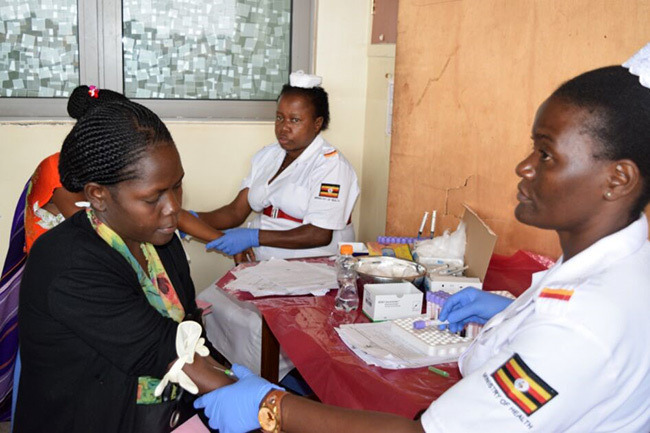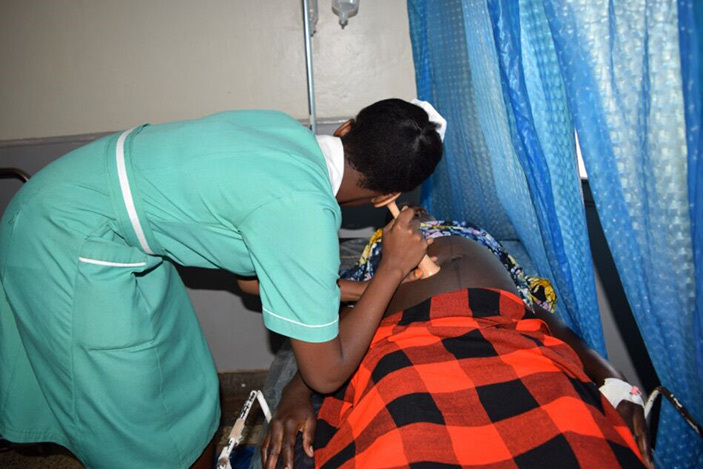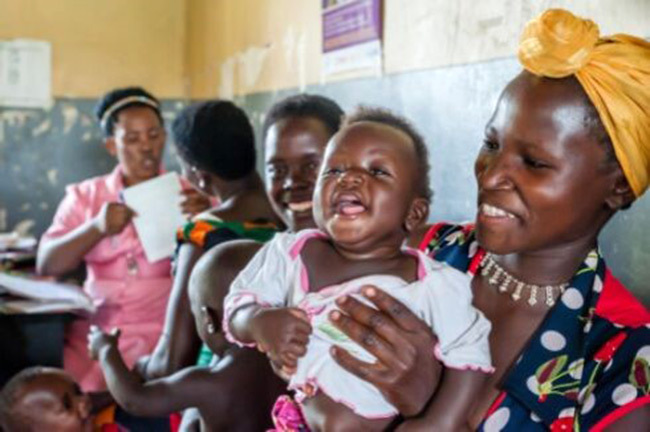How to save over 600 Ugandan women dying from pre-eclampsia annually
Jun 09, 2020

PRE-ECLAMPSIA, a complication related to pregnancy continues to claim lives of many women in Uganda.
Although many may develop signs and symptoms, seeking care is usually avoided due to myths and misconceptions like pre-eclampsia is witchcraft, it is a disease of cheating women and that the condition does not recur.
It is this lack of knowledge and myths surrounding this condition that expectant women are losing their lives before, during and after child birth.

On May 22nd, Uganda joined the rest of the world to commemorate World Pre-eclampsia Day under the theme: "Act early! Screen early!
This day was earmarked to raise awareness about preeclampsia and its global impact on the lives of mothers, babies and families.
To get a clear picture of what pre-eclampsia is, Prof. Annettee Nakimuli, Head, Department of Obstetrics and Gynaecology Makerere University / Mulago Specialized Women & Neonatal Hospital/Kawempe National Referral Hospital says it is a potentially dangerous pregnancy complication characterised by high blood pressure, and this condition alone claims lives of about 600 women in Uganda every year.
Preeclampsia usually begins after 20 weeks of pregnancy in women whose blood pressure had been normal.

Prof. Nakimuli also highlights that pre-eclampsia causes damage to organ systems most often the liver, kidneys, brain, and the blood coagulation system. Although it frequently occurs in pregnancy, it can also occur after the delivery, and also affects the baby before and after birth.
It is estimated that Pre-eclampsia affects 4% of the annual births (1,000,000) which is 40,000 women per year in the country.
Pre-eclampsia is responsible for 11 % of maternal deaths. At Kawempe Hospital, it affects 8% of admissions in the labour ward(4 patients daily) and is the leading cause of maternal death at 21% (mainly due eclampsia).
"Pre-eclampsia is the leading cause of maternal and infant mortality in Uganda especially in referral hospitals," Prof. Nakimuli points out
She adds: "Nationally, it is known that bleeding during and after child birth is the leading cause of death among women. However, pre-eclampsia is becoming the number one killer especially in big busy referral hospitals. This is because, health workers have now managed to deal with the former.

Tell-tale signs you have pre-eclampsia
Experts advise that in case you notice two or more of these signs during your pregnancy, please rush to a nearby health facility for treatment.
High blood pressure, swelling of the face, hands and feet, difficulty in breathing (gasping or panting), changes in vision (light flashes or loss of vision), headache that will not go away even with medication, nausea with or without vomiting after mid-pregnancy and excessive weight gain(more than 5kg per week).
Denis Kibira, the executive director of Coalition for Health Promotion and Social Development (HEPS Uganda) who is also a pharmacist says if an expectant woman with the above mentioned signs delays to seek for medical attention, complications develop into seizures/fits or non-communicable diseases and can lead to coma, brain damage and maternal or infant death.
In addition, Dr. Evelyn Nabunya, Senior Consultant (Maternal fetal medicine) and Acting Director, Mulago Specialised Women and Neonatal hospital points out that such deaths are as a result of late referrals with severe conditions to health facilities requiring intensive care unit.
"Some of the referrals are made with irreversible conditions leading to death. Death can be as a result of cardiac arrest, severe pneumonia, hemorrhagic shock, HELLP syndrome, a life-threatening pregnancy complication usually considered to be a variant of preeclampsia) and Antepartum hemorrhage(APH).
APH is bleeding from or in to the genital tract, occurring from 24+0 weeks of pregnancy and prior to the birth of the baby.
Global picture
Globally, eclampsia (seizures that occur during a woman's pregnancy or shortly after giving birth) and preeclampsia account for approximately 63,000 maternal deaths annually worldwide.
And according to different sources pre-eclampsia affects 5-8 % of all pregnancies world over contributes to 16% of maternal deaths (women dying in pregnancy, child birth or after birth). It translates to 76,000 maternal deaths per year and also contributes significantly to death of newborns, causing death of 500,000 infants per year.
Complications of pre-eclampsia in women and babies
Prof. Nakimuli explains that the condition does not only affect women but their babies as well. The effects can be immediate or long term.
Such complications include; stroke, kidney and liver failure, bleeding before delivery (abruption-placenta) and bleeding after delivery. Others are fluid retention lungs (Pulmonary edema).
For those that survive, they have increased risk of developing heart disease over their next five to 15years. For babies born to mothers with pre-eclampsia are likely to be born prematurely, stillborn or born too small (stunting).
How pre-eclampsia is managed
Denis Kibira, ED of HEPS Uganda expounds that when some expectant women present in the hospital, they are in a very devastating state; convulsing or in a coma, magnesium sulphate is the only medicine to stabilize such women in an emergency situation.
He acknowledges that although magnesium sulphate is a lifesaver and its benefits outweigh the disadvantages, it has very undesirable side effects that hamper its use.
Some of the side effects pointed out by Kibira include: flushing (warmth, redness, tingly feeling), heart disturbances, drowsiness, lowered blood pressure, breathing difficulties, confusion, nausea, vomiting, and muscle weakness.
He also says it is administered intravenously by dilution while watching/monitoring a patient so that the injection is stopped when side effects get really bad. A patient may even slip into a coma.
"Patients dread these side effects. Administration of the medicine is cumbersome, therefore, health workers especially at lower levels are also not keen on its use. This is the reason we appeal to manufactures to research on more user-friendly medicine," Kibira appealed
How to prevent severe consequences of pre-eclampsia
When it comes to the prevention of pre-eclampsia, experts note that the bigger part of the responsibility falls on expectant women with their partners. It all starts at home.
Expectant women are advised to start attending antenatal care as soon as they realize they are pregnant. They should also attend all their antenatal appointments at least four or more times during pregnancy.
"Regular and vigilant antenatal care is important in detecting pre-eclamptic toxaemia(PET) and mitigating the implications," Nabunya says
Adding; Women who are empowered with information and are supported by their partners have better health-seeking behavior, and demand for quality care.
Expectant women should eat right, exercise regularly and maintain a healthy weight, monitor their blood pressure and weight regularly, and contact their health care providers immediately their blood pressure becomes unexpectedly high and should endeavor to deliver from health facilities under the assistance of skilled attendants.
Call to action
Reducing and or ending maternal and infant deaths calls for collaborative efforts by different players. And this is what experts suggest different stakeholders can do.
Government: It should appropriate sufficient funding for maternal health particularly for medicines to manage pre-eclampsia. The government should also train health workers particularly at lower health facilities to manage pre-eclampsia, as well as revamp/streamline the Referral system to avoid late referrals.
In addition, it should sensitize the public on the importance of quality antenatal care, pre-eclampsia- its danger signs, complications and the role of partner and family support is very key.
Researchers and manufacturers: Research in alternative treatment options e.g. IV magnesium sulphate instead of IM (very painful), and should develop a treatment that is conducive for use.
Citizens: Robina Biteyi, the National Coordinator, White Ribbon Alliance Uganda states that citizens must hold policymakers accountable and speak out in demand of quality, and accessible health care. But should also play their role especially those who want to have children to prepare for pregnancy and childbirth.
Civil Society; Biteyi also encourages civil society to advocate for quality, equitable, and dignified health care for mothers and children and amplify the voices of women and girls, to reach policymakers.
"Together we can prevent preventable deaths of mothers and new-borns-Together we can do it" Biteyi concludes.
The writer is a freelance health/science writer
